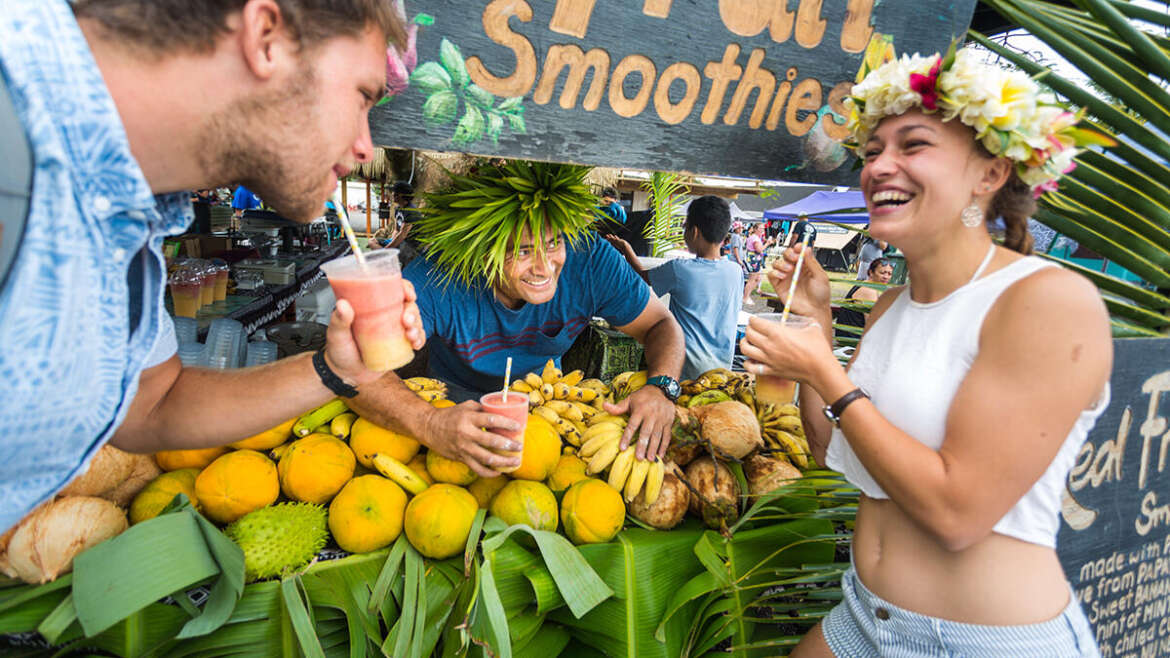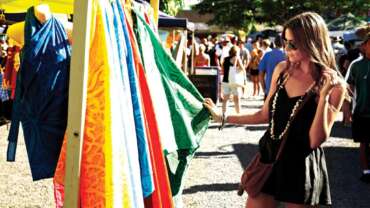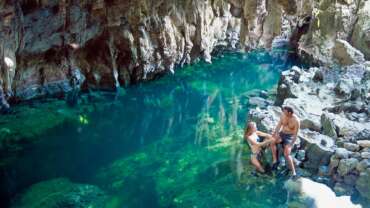Things to do in Cook Islands
WE INVENTED THE COLOUR BLUE.
There are plenty of ways to enjoy our islands and your holiday. Wander beaches with virtually nobody on them, relax in a hammock or get out on the lagoon and experience some of the activities on offer. The Cook Islands is like one big resort where you can easily go from pampering to paddle boarding; from kayaking to cocktails; from island hikes to island nights. The vibe is chilled and we can’t wait to welcome you to our Polynesian paradise.
SNORKELLING, SUP AND SEA SCOOTERS
Stunning views in the Cook Islands continue below the crystal clear waters where marine life is abundant, colourful and diverse in the lagoon. Explore the live coral reef all around the island by snorkelling right off the beach, joining a sea scooter tour or jumping on a SUP. Perfect conditions offer both impressive visibility and warm water all year round.
Snorkelling
Explore the live coral reef all around the island by snorkelling right off the beach. Perfect conditions offer both impressive visibility and warm water all year round.
Stand Up Paddle Boarding
Perfect for the vast turquoise playground of the Cook Islands, paddle boarding and the lagoon go together like bikinis and sunshine. A great way to cruise and explore, there’s so much to see.
Sea Scootering
Travelling at 4km and hour, sea scooters are a really fun and easy way to explore the incredible undersea creatures that call the shores of Rarotonga home.
CRUISING & BOATING
Choose from the many ways to enjoy our aquatic playground. There’s so much to see and explore, you can go out every day and never have the same adventure twice.
Simply set your speed to paddle or propeller powered and away you go: from exploring a shipwreck on a personal sea scooter to the entertainment of a glass bottomed lagoon cruise; from the relaxation of a meandering kayak to the downright thrill of a powerboat ride. Even more possibilities arise between July and October, the humpback whale spotting season.
FISHING
With translucent waters, tropical temperatures and pristine reefs dropping sharply into the Pacific Ocean, our little paradise is an angler’s paradise. From tossing a line in the shallows or venturing into the deep blue, all year round is a good time to try your luck. Fly fishing, lagoon fishing and spear fishing and all types of boat fishing are popular, from dropping a line from a kayak to going beyond the reef on a deep sea charter to chase yellow fin tuna, mahi mahi and wahoo.
Sport fishing
Rarotonga and Aitutaki have a large number of giant trevally on their reefs. The giant trevally or ‘GT’ is a great sport fish with light tackle and many an angler experiences the thrill of this catch-and-release species. Fishing on Rarotonga is unique as the island only has a 36 km circumference around the reef, meaning fishing locations in nearly all weather conditions. For the ultimate land-based fishing challenge, no angler can go past the fast-running, hard-fighting bonefish. These lie on the beautiful sand flats of Aitutaki and are every fly fisherman’s dream.
Fishing clubs
The Cook Islands are not crowded with fisherman, and the “Ra’ui” (protected areas) within the lagoon conserve the marine life and ensure fishing will remain a popular sport for generations to come. Fishing clubs on Rarotonga and Aitutaki welcome non-members and guided reef fishing can be arranged on Atiu.
SCUBA DIVING
Divers love the water clarity and diverse marine life that call our little paradise home. Temperatures from 23°C to 28°C, visibility up to 60m, steep oceanic drop offs, canyons, caves, a rainbow of colourful fish and walls of coral. With over 73 types of live coral and hundreds of fish species, it’s an underwater playground.
Scuba Diving in Rarotonga and Aitutaki
Rarotonga is a volcanic gently sloping plateau that ‘drops off’ into a 4,500m abyss with an abundance of coral formations and no soft corals. All deep sea diving trips are boat-based and most of the dive sites are just ten minutes from the departure point.
With over 30 dive sites, there are plenty of options for the beginner to advanced.
Divers searching for caves, colourful marine life and turtles will not be disappointed in Aitutaki, where a large number of dive sites are on offer, including night dives.
Scuba Diving experiences
Shallow lagoons that empty into the ocean by passages, offering exciting canyon dives with sharks, rays and turtles.
Drop offs, artificial shipwreck reefs and coral gardens.
Night dives, lagoon dives, 1 or 2 tank dives, beginner dives and a range of courses from open water, advanced open water, deep sea diving, boat diving and many more.
Family diving experiences – children aged 8 years and over can learn to dive in the safe, clear waters of the lagoon.
Some of the most rare fish in the world – paradise for a macro photographer.
5 reasons to dive in the Cook Islands
Easy access
Dive operators and spots are easy to access considering all of the Cook Islands are small and navigable. Trips are half-day excursions so after you’ve been for a dive, you’ll still have time to do other activities or relax on the beach.
Crystal-clear waters
With visibility up to 195 feet (60 meters), 73 types of live coral, and hundreds of fish species, the Cook Islands offers a captivating underwater playground.
Opportunities to get certified
Dive operators offer courses for beginners and advanced divers. You can be safely and properly certified by the time your vacation is over.
Marine protection under Marae Moana
The Cook Islands’ Marae Moana Act lays the framework for marine protection over 700,000 square miles of ocean area, which is more than four times the size of California. The legislation also bans large-scale fishing for 50 nautical miles around each island. Marine-protected areas have been proven to maintain and replenish biodiversity in the sea.
Diversity of dive experiences
Discover shallow lagoons that empty into the ocean through passages. Experience exciting canyon dives alongside sharks, rays, turtles, Giant Trevally, and schools of colourful fish. Between July and October, look out for Humpback Whales.
HIKING ON RAROTONGA
Reconnect with nature by exploring Rarotonga’s mountainous interior on a variety of guided and self-guided hiking trails. From being surrounded by native birds and butterflies to capturing incredible views of the island and surrounding lagoon and finding hidden waterfalls, hiking in Rarotonga is a must-do activity.
Hiking Tips With Our Aunties
Please watch this safety video. There are a range of unaccompanied treks that require a good degree of fitness, but should not be attempted without first informing others of your intentions.
Raemaru Trek (Raemaru, 350m) Moderate | 3.1km return | 90 mins average time | 15m rock climb to summit
The starting point for the Raemaru Trek is located on the back road in Arorangi. From the main road, locate Friendly Mart Convenience Store and take the inland road. Once you come to the backroad intersection, turn right following the yellow marked signs ‘Raemaru Trek’. Take another inland road in 80m (look for the yellow Raemaru sign). Follow to the end until you come to the start of the trek. Park on the side and off the road as this is a thoroughfare for inland residents.
Follow the orange markers on this trail.
QR Code self-guided tour is now available. All you need is a smartphone with a Vodafone visitor SIM card. You can purchase a visitor SIM card with Vodafone for $49 at the airport, Avarua or in Muri Beach. There is no regular tour offered but a private tour can be made by arrangement. Ask your hotel reception or head to our visitor centre in Avarua.
Cross Island Trek (Te Rua Manga 413m)
Moderate – Hard | 6km cross island trek | 3hrs – 3.5hrs average time
The Cross Island Trek on Rarotonga is true to its name as it does cross the entire island! It’s recommended that you begin the trail in the North and head South. Taking the public bus (that goes clockwise and anti-clockwise) is the best option but if you do have a car, driving would bring you closer to the trailheads.The trek is marked with orange markers for experienced trekkers who want to do this hike on their own.For those interested in a fully guided tour, explore Pa’s Cross Island Trek.
As the trek ends at the Papua Waterfall (Wigmores Waterfall), feel free to take a dip and cool off after the hike. Please note that water is dependant on if it has been raining days prior to your hike.
If you decide to just do a hike up to “The Needle” (Te Rua Manga) you can drive up to the North side, trek up to the summit and return back the same way you went up.
The North Trailhead: Located in Avarua, you can take the bus here from almost anywhere on the island. Track down the Pandanus Gas Station (behind Sea Salt Takeaway) and walk straight up the road behind it. Look for Uraua Drive and carry on until the end of the road. You’ll see the trailhead sign and a map.
The South Trailhead: The South side of the trail starts (or ends) at Wigmores Waterfall, at the end of Papua Road on the South side of the island. To drive up the road to the waterfall, you’ll be asked for a donation ($2 for bikes and $5 for cars/trucks). If you’re ending your trek this way, there’s no need to donate. Please note that you will see a warning sign recommending starting the trail from the other direction but this is not necessary as you can start from the South trailhead.
EXPLORE BY LAND
The spectacular natural beauty of a little paradise is more than just stunning beaches. Breathtaking jungle-clad mountains of the interior cascade to the sea, like Jurassic Park without the dinosaurs. Step back in time to find a paradise refreshingly undeveloped. Lush green vegetation everywhere, warm locals in simple yet colourful houses and no building taller than a coconut tree, it’s a true Polynesian experience.
ISLAND NIGHTS
No visit is complete without an ‘Island Night’ cultural show for an unforgettable experience. Available at a variety of resorts and cultural centres on Rarotonga, Aitutaki and Atiu, they are a wonderful evening where passionate locals share our history and traditions through music, song, dance and food. Highly entertaining and fun for everyone, especially when the crowd participates in our traditional dance moves.
Island Nights in Rarotonga
A highlight for visitors are the exhilarating performances at cultural villages like Te Vara Nui and Highland Paradise Culture Centre or by local dance teams during the island nights staged around Rarotonga by the resorts and hotels. Delicious buffet meals featuring favourite local dishes like ika mata (marinated raw fish salad) are included in the island night packages. There are also the island nights where an umu kai is featured. This buffet style feast of food cooked in a traditional earth oven or umu is a wonderful experience.
VILLAGE TOURS
Ancient ways of tribal life can be experienced at one of our authentic village tours on Rarotonga or Aitutaki. On the same soil our ancestors lived and died, learn about our tribal customs and rich history of tribal warfare, invasion and cannibalism before the arrival of Christianity.
Examine historical artifacts such as farming tools, weapons and traditional dress. As well as cooking techniques, weaving is demonstrated for everything from making huts and bags with kikau to clothing, hats, mats and fans from both pandanus and rito.
MARKETS
Discover more about our Cook Islands culture by exploring the local markets on offer. On Saturday mornings, take a trip to the Punanga Nui Markets for local food stalls, drinks, head ei’s, pareu’s and souvenirs (to name a few). The Punanga Nui Market also hosts a night market on Thursdays. There’s also the Muri Night Markets on every Tuesday, Wednesday, Thursday and Sunday which is great for local cheap eats and good vibes.
The Punanga Nui Market in Avarua, Rarotonga’s main town, offers free entertainment, fresh food stalls, organic coffee, and authentic souvenirs like pearls, artwork, crafts and hats made of coconut frond. While the market is open until midday, early Saturday morning is the best time to go for locally grown fruits and vegetables as well as homemade treats like poke. Also make sure to head over to the main stage from about 10am to enjoy live music and dancing. The Punanga Nui Market also features a night market on Thursdays from 5pm to 9pm, offering a wide range of cuisine options. Helpful tip – remember to bring your New Zealand Dollars or Cook Islands coins as most vendors are cash only.
MURI NIGHT MARKETS
The Muri night markets in the Muri Beach Village are a great way to curate your own dinner from the various food trucks, stalls and stands all while mixing and mingling with tourists and locals alike. Open Sunday, Tuesday, Wednesday and Thursday evenings from 5pm, the night markets offer a variety of food from local BBQ meals, seafood, fresh drinking coconuts, chicken curries, wok fried noodles, pizza, desserts and more.
A FEW HELPFUL TIPS
Go early to have the widest selection of food on offer.
Remember to bring your New Zealand Dollars or Cook Islands coins as stalls are cash only.
Get to the markets by bus or if you are driving, park just off the road.





